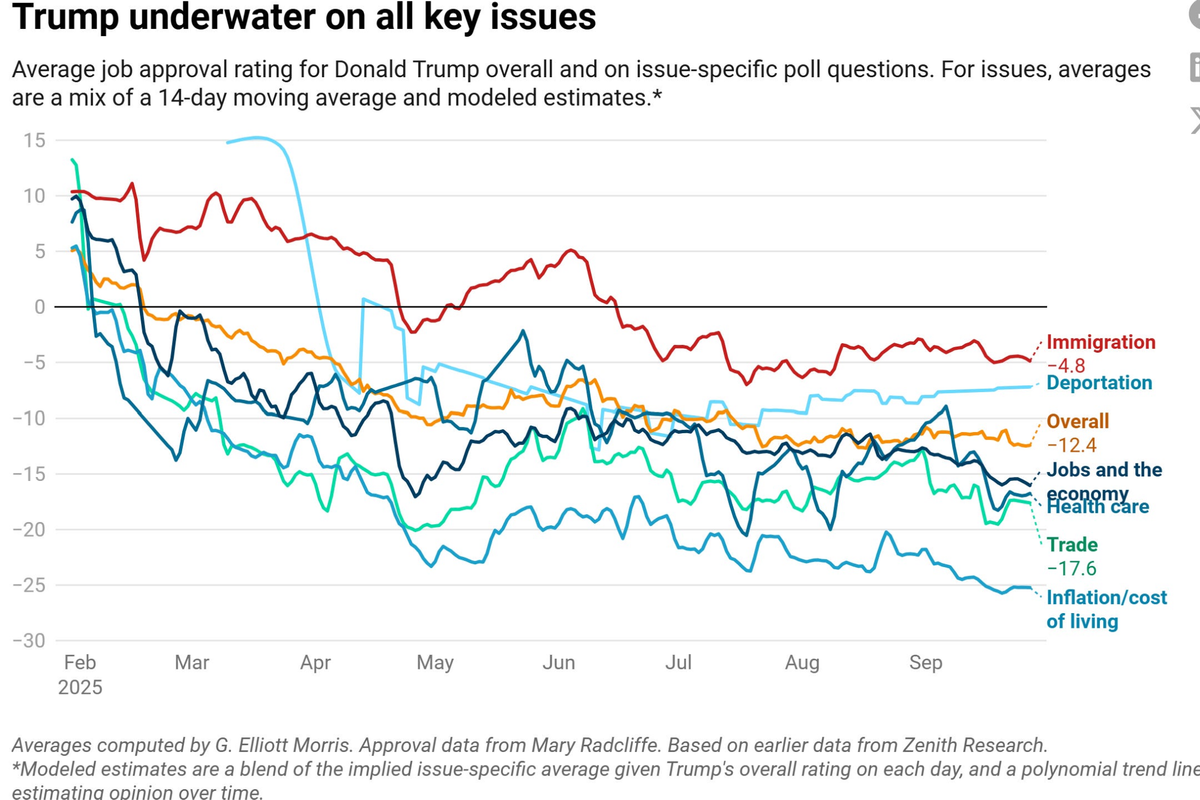
Two very important things are concurrently ongoing in the U.S. One is fast-moving, headline-generating, relentlessly shocking, and existentially threatening to our nation’s long democratic project. The other is a slow burn, prosaically plodding along in the background, though it is equally important, perhaps even more so, than the first thing. I've written about here, but it is largely crowded out in the media by much newsier and scarier developments.
Readers know what thing one is, but just to be explicit, I’m of course talking about Trump’s attack on democracy, from sweeping tariffs, to deportations, to mass firings (including of those who produce accurate data which he doesn’t like), to weaponizing the Justice Department to go after his enemies.
But what’s thing two? It’s Trump’s fading popularity on the issues that matter most to people. It’s the fact that he’s underwater on every important issue.
This is born of the fact that he continues to exploit his extremely and uniquely concentrated power to double down on actions that turn regular, non-MAGA people off. When it comes to the economy, most people are most worried about affordability. Yet he continues to double down on big tariffs, most recently on prescription drugs, kitchen cabinets, furniture, and heavy trucks.
He and his minions are now putting themselves between you and the late-night TV you watch. I grant that a tiny share of Americans watch Jimmy Kimmel, but that’s not the point. The way this works is that people who reasonably choose to block out politics—“it’s just a bunch of rich, old men making DC noise”1—find themselves impinged upon by something close to home, as in choosing to watch what they want. That may not sound like as big a deal as weaponizing the DoJ, but there are many Americans for whom the free-speech intrusion into their everyday life feels like a bigger intrusion than the new Comey indictment.
It’s even worse, and considerably more dangerous, when they intrude in your medicine cabinet, the fact that when you open the drawer to get a Tylenol, you have to hear in your head the president warning you, against all evidence, to not go there.
I predict—and these are measurable predictions; I could, of course, be shown to be wrong—that the administration continues to double and triple down on these and many more such negative intrusions into the lives of regular people, and that as they do so, their popularity will continue to erode.
My predictions stem from my view that the two forces I’m elevating in this note are closely linked. Force one amplifies force two. The administration is increasingly drunk on its sweeping powers, unblocked by Congress and—in the part that scares me most—unleashed by what is arguably the most dangerous Supreme Court in our history.
But not unlike a drunk person endangering you on the streets, or just—and this may be a better analogy given my intrusion theory of the case—ruining your evening by shouting dumb sh— and over-laughing such that you can’t enjoy a simple meal out with the family, the further out they go from existing norms in ways—this part is critical—that show up in your everyday life, the more large shares of Americans are going to want them gone. If I’m right, then the voters that put them over-the-top will be like: “I thought I was voting for lower prices, lower interest rates, more affordable housing. I’m getting higher prices, cracks in job market such that my college-grad kid can’t find work, and a bunch of bullsh— about Tylenol.”
One objection to my rap is “they don’t care what people think about them.” Clearly true. If they did, force one would cease proliferating. But it’s not my point. My point is that they’re increasingly unpopular, and not just with the Democrats, the left, the folks reading this post. But with the large, swing share of the electorate wherein resides the precious “median voter.”
Another objection is thus, “Okay, but what if there isn’t another election?” That is a very potent challenge indeed, and should it become anything close to reality, we must fight like our lives and those of our progeny depend on it. Because they do.
Jared Bernstein is a former chair of the White House Council of Economic Advisers under President Joe Biden. He is a senior fellow at the Council on Budget and Policy Priorities. Please consider subscribing to his Substack.
Reprinted with permission from Econjared.
- Poll: Trump Approval Plunges Among Young Voters (Especially Men) ›
- As Congress Returns, GOP Majority Will Confront Big Trouble ›
- New 538 Poll Average Shows Trump Approval In Steep Decline ›







